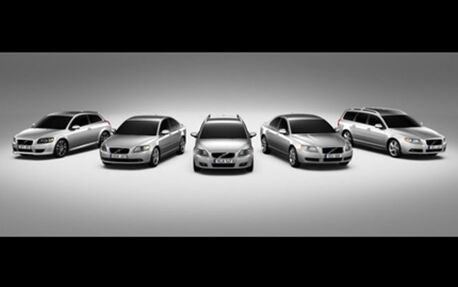Flexifuel engines give Volvo one of the market's broadest ranges of E85 models
Volvo Cars has one of the car market's broadest ranges of E85 models. All told, five models are on offer, each available with one or two Flexifuel engines. Most recently, the Volvo V70 and Volvo S80 were introduced with a five-cylinder 2.5-litre turbocharged Flexifuel engine producing 200 hp (147 kW) and 300 Nm of torque. From a purely technical viewpoint, the Volvo Cars engine experts would have been able to boost engine power to quite a bit over 200 horsepower. However, this would have necessitated a richer air/fuel mixture at high revs, which in turn would result in considerably reduced fuel economy.
"200 horsepower is an ideal level for this engine since it means it is possible to cater for daily driving needs without any need to make the air/fuel mixture richer than the ideal figure. We are convinced our customers will appreciate that we prioritise competitive fuel economy," says Magnus Jonsson, Senior Vice President, Research & Development at Volvo Cars. "The 2.5FT variant can be specified with either a manual or automatic transmission. This emphasises our aim to make a wide range of our cars available as environmentally optimised models that do not compromise on comfort, driving pleasure or scope for individualisation," adds Magnus Jonsson. This is further highlighted by the fact that Volvo Cars' R-design - a sporty, factory-fitted option pack with a range of specially designed exterior and interior features - is also available for models with Flexifuel engines.
One of the broadest ranges on the market
Both the Volvo V70 and the S80 have since the end of 2007 also been available with a four-cylinder 2-litre Flexifuel engine (2.0F) producing 145 hp (107 kW) and 190 Nm of torque. This means that Volvo Cars has one of the market's broadest Flexifuel ranges. All told five models - the Volvo C30, S40, V50, V70 and S80 - are available with one or a choice of two E85 engines. The Flexifuel variants of the Volvo S40, V50 and C30 have a four-cylinder 1.8-litre engine (1.8F) producing 125 hp (92 kW) and 165 Nm of torque.
All the engines and relevant components have been modified to run on E85.
The fuel consumption (EU, mixed cycle) of the new 2.5FT is 9.4 l/100 km (V70) and 9.2 l/100 km (S80) with manual transmission and 10.4 l/100 km (V70) and 10.1 l/100 km (S80) with automatic transmission. For the other models, fuel consumption (EU, mixed cycle) is 7.3 l/100 km (C30 1.8F), 7.4 l/100 km (S40 1.8F and V50 1.8F), 8.6 l/100 km (V70 2.0F) and 8.3 l/100 km (S80 2.0F). The Flexifuel cars can be run on bioethanol E85 or on 95 octane unleaded petrol, or on any mixture of these two fuels. When driving on E85, fuel consumption increases by 30 to 40 percent since bioethanol has lower energy content. The exact difference depends on factors such as driving style, ambient temperature and variations in fuel specification.
Increased demand in Europe
Bioethanol is an entirely renewable fuel that can be made from most types of biomass, such as sugar-cane, corn, wheat, sugar-beet or cellulose. When running on E85 (85 percent bioethanol, 15 percent petrol) the carbon dioxide produced from ethanol is part of Nature's own carbon lifecycle. Volvo Cars is launching its Flexifuel models on increasing numbers of markets. In addition to Sweden, these models are sold on the following markets: France, Norway, Italy, Germany, Austria, the Netherlands, Spain, Britain, Ireland, Belgium, Switzerland and Thailand.
Furthermore, they are set for introduction in many European countries. All told, Volvo Cars expects to sell 20,000 Flexifuel cars in 2008.
